Hopeful Beginnings in Bonn
Air Date: Week of April 3, 2009
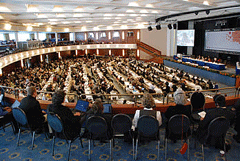
UNFCCC delegates in session. (Photo: Leila Mead)
The Obama administration has committed to work with the global community to take action on climate change. But the European Union fears the U.S. won’t make deep enough reductions in greenhouse gas emissions. Many developing countries want cash and access to meet tougher emission goals. Host Steve Curwood speaks with U.S. climate envoy Todd Stern and chair of the ad hoc working group of the UNFCCC Michael Zammit-Cutajar.
Transcript
CURWOOD: From the Jennifer and Ted Stanley Studios in Somerville, Massachusetts - this is Living on Earth. I’m Steve Curwood.
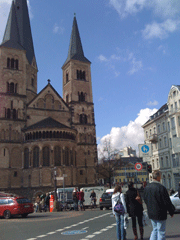
Downtown Bonn, Germany.
STERN: My team and I came here determined to make up for lost time. America is now once again strongly committed to developing a global response to climate change. We do not doubt the science, we do not doubt the urgency and we do not do not doubt the enormity of the challenge before us.
CURWOOD: Mr. Stern said the US now plans to reduce its global warming gas emissions back to 1990 levels by 2020 and make an 80 percent cut by 2050. Mr. Stern also explained why the US would continue the talks among the world’s sixteen major greenhouse gas emitters.
Many negotiators saw this Bush Administration initiative as a snub to Kyoto – but Mr. Stern said it will now be useful because top UN climate officials will also be at the table.
STERN: This isn't a negotiating forum but we hope it will be an opportunity to have the kind of discussion that can facilitate agreement in Copenhagen.
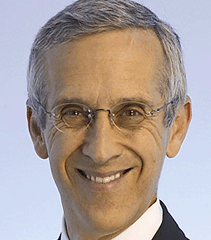
Todd Stern. (Courtesy of the U.S. State Department)
Despite these moves, the US is still coming under fire for doing too little too late. Michael Zammit-Cutajar chairs the working group that’s charged with coming up with language for a renewed climate treaty by the final meeting scheduled for December in Copenhagen. I asked him what underlies the present criticism of the US.
ZAMMIT-CUTAJAR: Well, I think we’re all very encouraged by the re-engagement of the USA and President Obama. The U.S. administration is caught in the position which it inherited on the 20th of January and its judgment of the best it can do with that starting point is that it can get back to 1990 levels by 2020. Now, this is twenty years later than what was required by the convention signed in 1992, ratified in 1994. The E.U. by comparison has been working on its emissions limitation goal all the while. It hasn’t missed out on the eight years that preceded President Obama, and its picture is somewhat different. It is aiming to be twenty percent or even thirty percent below 1990 levels by 2020. So those are the two figures on the table, and that is why some people are saying what the U.S. is doing is not enough. Now if you measure both efforts - E.U. and U.S. - from a different baseline from where they both where in 2005, you’ll find that the reduction effort is comparable.
One of the debates that is still ahead of us and that we’re going to have in the next days here is this question of comparability and how do you compare effort in different national circumstances. Countries can do more or less depending if they’re big or small or cold or warm, etc. What the E.U. has said is that it’s committed unconditionally to a twenty percent reduction below 1990 levels. If other developed countries make comparable efforts, and it hasn’t defined what that means, it will go to thirty. So that’s the E.U.’s negotiating position. I guess that the E.U. is trying to encourage the U.S. to go a step further than what it’s already said.
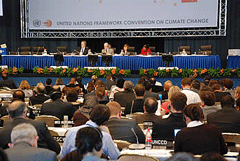
Delegates meet in Bonn, Germany. (Photo: Leila Mead)
ZAMMIT-CUTAJAR: I can’t answer that question, you know. The U.S., first of all, has a lot to do to convince itself, I mean its Constitutional bodies, its public opinion, its industrial and labor interests, what it can do and what it should do. From what I can understand the U.S. is looking very closely at what China will do. China in a very different category in terms of level of development, yet the other big country around. But reducing or limiting emissions growth is not the only question on the table. That is what we’ve talked about so far. The other number that is important goes with a dollar sign. How much money the rich industrial countries are willing to put on the table and on what conditions to enable actions by developing countries to make their fair contribution.
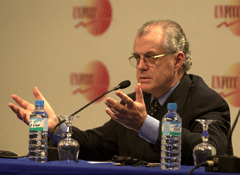
Michael Zammit-Cutajar (Photo: Leila Mead)
ZAMMIT-CUTAJAR: It’s a very diverse group. But the group as a whole is looking for strong leadership from developed countries, such as the U.S. Strong leadership on cutting emissions, so there’s a certain sense of wait and see. You are committed to lead, that is in the convention. Once we see what you are doing to express your leadership, then we will follow. That is what China is saying. And that’s what the littler ones are saying. And then there’s the question of finance. We need help from you, sometimes it’s money, sometimes it’s more access to technology, to do what we need to do, what you would like us to do to contribute to the global effort.
CURWOOD: Michael Zammit-Cutajar, Chairman of the Climate Change Convention’s working group.
Links
Listen to Living on Earth’s coverage of talks in Poznan, Poland.
Living on Earth wants to hear from you!
Living on Earth
62 Calef Highway, Suite 212
Lee, NH 03861
Telephone: 617-287-4121
E-mail: comments@loe.org
Newsletter [Click here]
Donate to Living on Earth!
Living on Earth is an independent media program and relies entirely on contributions from listeners and institutions supporting public service. Please donate now to preserve an independent environmental voice.
NewsletterLiving on Earth offers a weekly delivery of the show's rundown to your mailbox. Sign up for our newsletter today!
 Sailors For The Sea: Be the change you want to sea.
Sailors For The Sea: Be the change you want to sea.
 The Grantham Foundation for the Protection of the Environment: Committed to protecting and improving the health of the global environment.
The Grantham Foundation for the Protection of the Environment: Committed to protecting and improving the health of the global environment.
 Contribute to Living on Earth and receive, as our gift to you, an archival print of one of Mark Seth Lender's extraordinary wildlife photographs. Follow the link to see Mark's current collection of photographs.
Contribute to Living on Earth and receive, as our gift to you, an archival print of one of Mark Seth Lender's extraordinary wildlife photographs. Follow the link to see Mark's current collection of photographs.
 Buy a signed copy of Mark Seth Lender's book Smeagull the Seagull & support Living on Earth
Buy a signed copy of Mark Seth Lender's book Smeagull the Seagull & support Living on Earth

